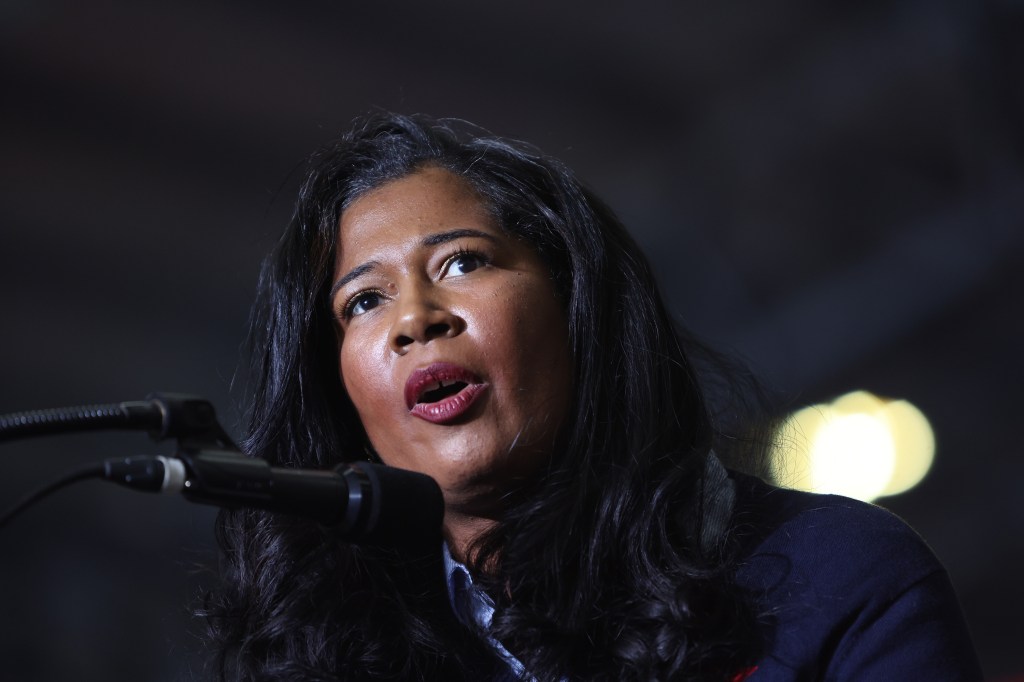An evangelical church in Pennsylvania is in hot water after it premiered a right-wing propaganda film promoting Republican political candidates, including gubernatorial candidate Doug Mastriano, earlier this month.
Community members have since filed complaints with the Internal Revenue Service, arguing that the church, located in Lower Allen Township (about seven miles from Harrisburg), violated federal 501(c)(3) rules banning the promotion of political candidates and should therefore have its tax-exempt status revoked.
Videos by VICE
At first glance, the controversy surrounding the Christ Community Church might just seem like hyper-local drama. However, its apparent embrace of Mastriano’s campaign puts it squarely in a simmering national concern about surging Christian nationalist ideology politicizing American churches around the country. That concern has reignited the decades-old debate around churches, specifically accusations that some are just political organizations masquerading as religious entities in order to maintain tax-exempt status.
Mastriano, currently a state senator, attended and spoke at the premiere of The Return of the American Patriot: The Rise of Pennsylvania, along with its producer, Steve Turley, a self-described “populist nationalist” who devotes much of his YouTube channel to hyping the possibility of red-state secession.
The film’s trailer, which intersperses historical reenactments of the American Revolution with scenes from anti-lockdown protests, makes the argument that Pennsylvania’s history as the “birthplace of America” has been sullied by the policies of incumbent Gov. Tom Wolf, a Democrat. “Our ancestors cannot be taken for granted. Historically, we’ve been the guiding light of the nation,” Mastriano says in the trailer. “In the past century, not so much so.”
Once, the documentary argues, Pennsylvania was the place where Revolutionaries overcame tyranny; today, that tyranny has returned, in the shape of COVID-19 restrictions (despite the fact that no such restrictions currently exist in Pennsylvania).
“We believe this year is a decisive year,” Mastriano says. “We get a Governor Mastriano, Pennsylvania will be that light once again and the freedoms will be restored.”

In the last year, Mastriano has attained some national prominence, in part because he crossed police barricades during the Capitol riot (though says he never went in the building), and because of his embrace of Christian nationalist ideology. Mastriano, like other Christian nationalists, has deemed America’s founding philosophy of the separation of church and state a “myth.” Christian nationalists believe that America is an inherently Christian nation, and that its laws and policies should reflect evangelical values. In this theological framework, right-wing culture issues — the results of the 2020 election, COVID-19 lockdowns, or diversity in Disney movies—suddenly gain Biblical significance and turn into primordial battlefields.
Additionally, Mastriano’s associations with conspiracy theorists and extremists have also been the source of scrutiny over the years. He previously shared anti-Muslim memes on Facebook, posed with anti-government “Boogaloo Bois” at anti-lockdown rallies, and spoke at a QAnon event this year. He paid Gab, an online haven for white nationalists, $5,000 for “campaign consulting” earlier this year, for which he apparently gets automatic followers from the site, HuffPost reported recently.
A small crowd of nine protesters gathered outside Christ Community Church ahead of last week’s screening, as hundreds of Mastriano’s supporters mingled with churchgoers in the line to go inside.
Amber Mowery, a resident of Camp Hill, was one of those protesters. She showed up with a sign saying “Separation of Church and State.” (Mowery’s sign was apparently one of the more restrained ones in the group. Others included “Jesus Loves Sluts,” “This is Fucking Bullshit”, and “Hail Satan; Boo Mastriano.”) Mowery told VICE News that the crowd jeered at them and called them “losers.” She also said that Pastor Joel Saint of Independence Reformed Bible Church in Morgantown, Pennsylvania (about 60 miles east), approached Mowery and others to offer him a definition of “white nationalist.” (Saint, who attended an anti-lockdown protest in 2020 and told Breitbart in an interview that he believes the Bible “sets the limits on political authority.”)

Mowery said another woman repeatedly claimed there was “no such thing as separation of church and state.” There were trucks parked outside the church saying “Doug Mastriano for Governor” and inside the church, attendees chanted “Doug for Gov” according to Michael Yoder from the conservative local paper The Lancaster Patriot and sang the national anthem.
Turley introduced the film, bemoaning cancel culture (two movie theaters eventually decided against screening the film amid public pressure), and made a transphobic remark about Rachel Levine, who serves as the U.S. assistant secretary for health and is one of the few openly transgender government officials in the U.S. She previously served as secretary of Pennsylvania’s Department of Health.
Christ Community Church’s executive Pastor John March has since insisted that the film premiere was not a church event, PennLive reported. They leased out their church to Turley’s production company for the purpose of the screening.
March also says that he and other church leaders, along with lawyers, crafted an agreement with Turley that ensured they were in compliance with federal law, specifically they prohibited specific endorsements of a particular candidate or party, fundraising, or hawking of political paraphernalia at the event. “There was no campaigning in the event, whatsoever,” March told the news outlet.
Churches and other religious organizations have been exempt from federal taxation since the modern federal tax code was ratified in 1913. Since then, many churches have ballooned into lucrative enterprises, and have frequently tested the limitations of their tax-exemption status by venturing into politics, often with little intervention or enforcement by the IRS.
Follow Tess Owen on Twitter.




